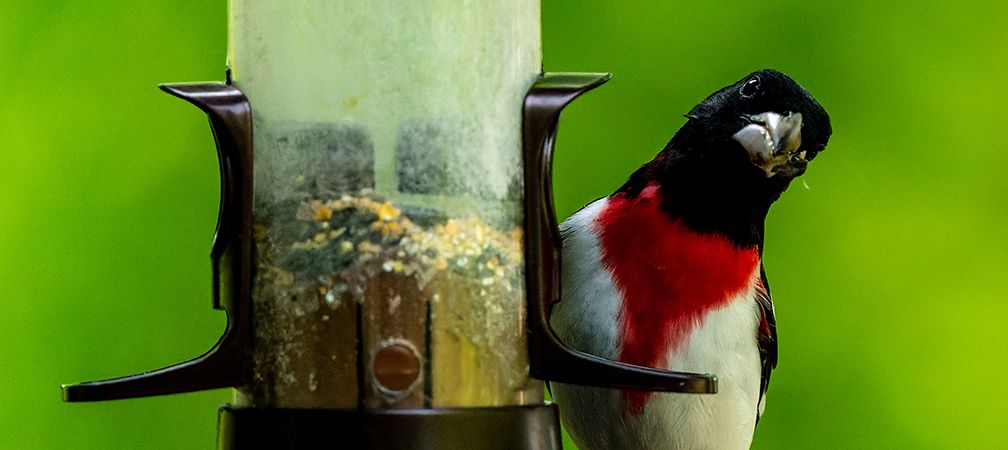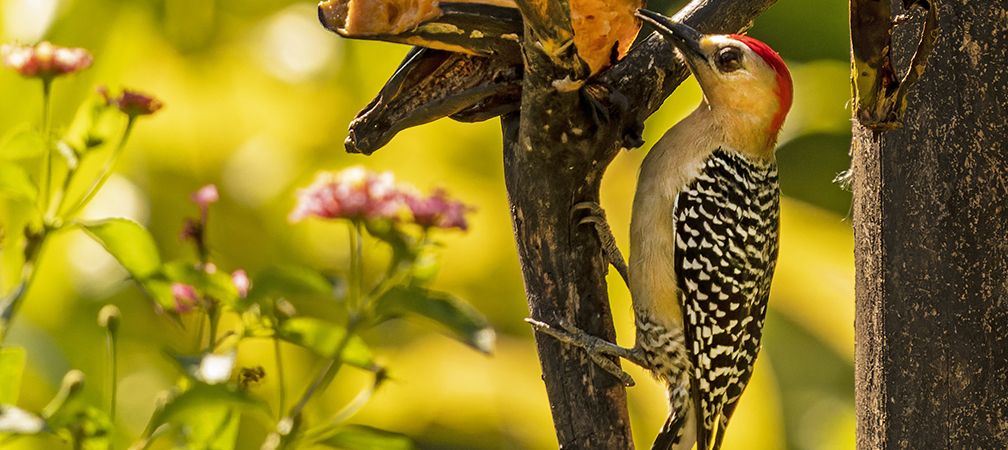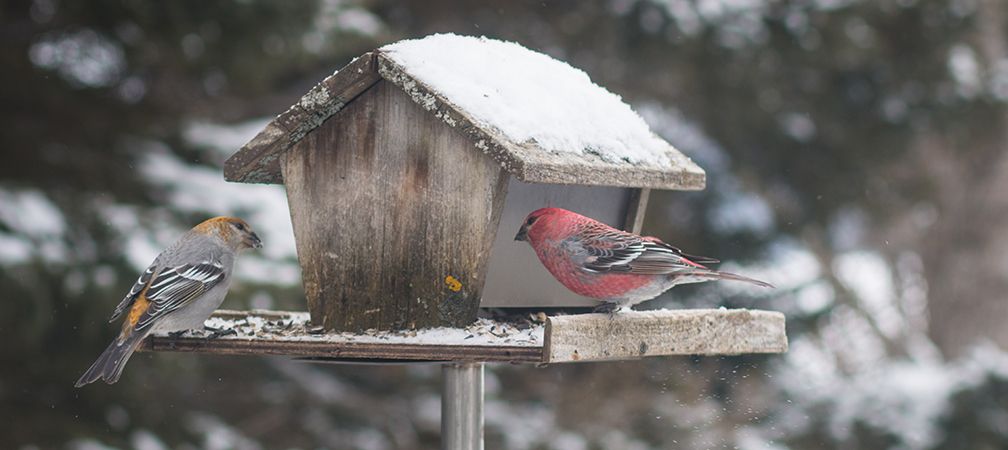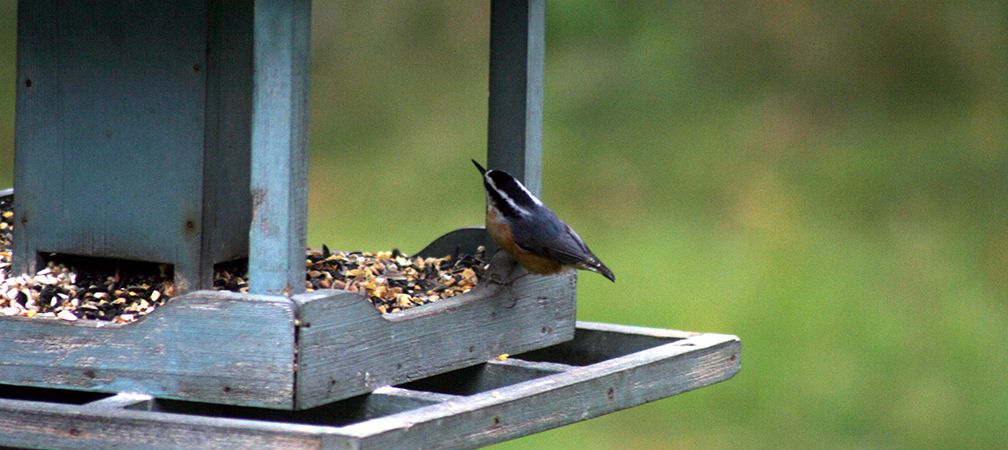Ontario Nature Blog
Receive email alerts about breaking conservation
and environmental news.
© Lora Denis
Downy woodpecker and Rose-breasted grosbeak © Dale Darcy
Nature has an essential yet underrated influence on human wellness. It triggers feelings of awe, joy, connection, self-reflection, and holistic wellness. A simple way that many North Americans engage with nature is through their bird feeders. Birds cast no disparity toward age, gender, ethnicity, health, abledness, etc. They simply exist and through the practice of observation, they invite us into simple existence with them.
Bird feeders are a cost-effective and accessible way to foster this connection. In my search to better understand how birds contribute to human wellness, I have come across stories of people and agencies that have initiated bird feeder programs at hospices in an attempt to maintain an important connection to nature at the end of life. It is my goal with this article to highlight the benefits of bird feeders on resident and staff wellness in hospice and palliative care settings.

In 2020, the Peterborough Hospice in Ontario received a donation of bird feeders from the Peterborough Field Naturalists (an Ontario Nature member group) and The Avant Garden Shop to place outside each resident’s window. The goal is to normalize the patient experience and bring “healing distraction” to anyone who watches the birds. In 2019, Hospice Home Care in Little Rock, Arkansas also received a donation from Audubon Arkansas of bird feeders for each resident’s window. The Bird Conservation Director of Audubon Arkansas also donated books to help residents identify the birds at their feeders.
Concordia Lutheran Ministries runs a ‘Cardinal Project’ for the Concordia Hospice of Washington, which encourages others to donate bird feeders under $25 to the hospice care settings. Likewise, in January 2023, Patricia Cousineau received a grant for $10,000 to engage in community projects, including donating bird feeders and seeds to Mariposa House Hospice in Orillia, Ontario. As you can see, there are countless individuals and agencies across North America independently fundraising for or providing bird feeders to hospices.

Birds contribute to our environment in many ways. Barry Yeoman, contributor to Audubon’s Magazine, reminds us that “birds keep farmers in business; they protect our drinking water by preventing erosion; they slow the spread of disease; they keep the furniture industry supplied with timber; they provide critical environmental data”. They also contribute to our ‘psychological environment’ simply through presence that can tap into one’s sense of beauty, joy, awe and meaning.
Extensive evidence suggests that nature has been found to help improve mood, recovery rates, learning rates, cognitive functioning, mental stamina and focus, and decrease blood pressure and violent/criminal behaviour, among other benefits. Bird feeders provide a simple solution to encourage the presence of nature, contributing to overall wellness. Further, bird feeders are affordable, accessible, and easy to maintain.
Those who engage in feeding wild birds may do so to experience benefits such as increased senses of pleasure, relaxation, usefulness and connection. A recent study has concluded that a simple 30-minutes of birdwatching can foster “lower anxiety, greater wellbeing, and increased connection to nature, with the greatest benefits observed when people are prompted to engage emotionally”. Observing birds evokes emotion within the watcher, particularly when prompted, which then has the power to positively affect their emotions and behaviours. Cognitive Behavioural Therapy informs us that emotions, thoughts and behaviours are all connected and can influence one another.
“Bird feeders hold the power to affect positive cognition, emotions and behaviours, which may be of benefit in hospice and palliative care spaces where emotions and behaviours may be heightened.”

Reaching the end stages of life can come with heavy emotions, such as grief, sadness, fear, anger, etc. for individuals. These emotions are not limited to those who are in end of life stages but also often reach their caregivers. Staff within hospice and palliative care settings may also suffer from increased occupational stress, with “27% of the social workers who served palliative care patients experienc[ing] burnout”. When exploring the economic impacts of nature design, it was found that “10% of employee absenteeism can be attributed to architecture with no connection to nature”. It has been concluded that nature contact can provide far-reaching benefits to “communities and individuals at higher risk of ill health”. This includes both individuals and staff within hospice and palliative care settings.
Nature contributes to the occupational wellness of employees and that increasing nature exposure in working environments could prove to be a cost-efficient and practical strategy to enhance such wellness. Nature exposure also contributes to holistic health and that utilizing bird feeders is a cost-effective way to encourage this within hospice and palliative care settings.
Placing several bird feeders around the property in view of the residents and staff indoors can contribute to cognitive, emotional, physiological and spiritual wellness within them, which may then promote harmony and connection. Further, staff and residents can share in co-creation, from building simple feeders (such as from pine cones, lard and nyjer or black sunflower seed) to picking spots for placement together.
More and more people are recognizing the benefits outlined in this article and are pushing to incorporate bird feeders into hospice care. Residents and staff at the Peterborough Hospice, Hospice Home Care, Concordia Hospice, and the Mariposa House Hospice are now experiencing the positive impact of bird feeders. It is my hope that more hospices and palliative care settings will adopt the practice of placing bird feeders in view of those working and living indoors because therein lies a seed of wellness for all.


Gananoque Lake Nature Reserve © Smera Sukumar